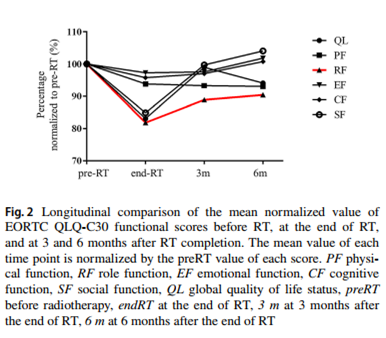글로벌 연구동향
방사선종양학
- [Radiol Med.] Clinical significance of radiation dose-volume parameters and functional status on the patient-reported quality of life changes after thoracic radiotherapy for lung cancer: a prospective study
서울특별시보라매병원 / 김병혁, 김수지*
- 출처
- Radiol Med.
- 등재일
- 2021 Mar
- 저널이슈번호
- 126(3):466-473. doi: 10.1007/s11547-020-01273-0. Epub 2020 Sep 5.
- 내용
Abstract
Purpose: To date, limited data exist about the relationship between radiation dose-volume parameters and patient-reported quality of life (QOL) after thoracic radiotherapy (RT) for lung cancer. We conducted this prospective study to investigate which clinico-dosimetric factors have an impact on functional declines and symptom developments after thoracic RT for lung cancer.Materials and methods: The study included 44 patients who had underwent thoracic three-dimensional conformal RT at our institution from 2016 to 2017. The health-related QOL was assessed using the EORTC QLQ-C30 and QLQ-LC13 questionnaires before RT (preRT), at the end of RT (endRT), and 3, 6, and 12 months after the completion of RT. RT dose-volume parameters of adjacent normal organs such as the lung, heart, and esophagus were retrieved and used for regression analysis.
Results: Thoracic RT induced a temporary deterioration of many of the functional statuses and symptoms, but most of those improved and recovered to baseline levels 3 months after RT. However, the role function (RF) decline persisted until 6 months after RT (p < 0.05). Dysphagia showed the most noticeable change at the endRT (p < 0.001). In the multiple regression analysis, the absolute volume of body received at least 50 Gy (p = 0.021) and a preRT RF score (p = 0.001) was significantly associated with the endRT RF scores. Dysphagia at the endRT was significantly associated with the V40 of the esophagus (p = 0.047), preRT emotional function (p = 0.029), and receipt of concurrent chemotherapy (p = 0.022).
Conclusions: Both the dosimetric parameters and preRT functional status have an impact on the weak aspect of patient-reported QOL, which may cause poor treatment compliance during and after thoracic RT. For patients with a low preRT QOL score or those having large tumor which may result in higher dose volumes, careful RT planning could prevent the deterioration of QOL after RT.

대표그림 설명: Longitudinal comparison of the mean normalized value of EORTC QLQ-C30 functional scores before RT, at the end of RT, and at 3 and 6 months after RT completion.
Affiliations
Byoung Hyuck Kim 1 , Jin-Soo Kim 2 , Ki Hwan Kim 2 , Hyeon Jong Moon 3 , Suzy Kim 4
1 Department of Radiation Oncology, Seoul Metropolitan Government-Seoul National University Boramae Medical Center, 20, Boramae-ro 5-gil, Dongjak-gu, Seoul, 07061, Republic of Korea.
2 Department of Internal Medicine, Seoul Metropolitan Government-Seoul National University Boramae Medical Center, Seoul, Republic of Korea.
3 Department of Thoracic and Cardiovascular Surgery, Seoul Metropolitan Government-Seoul National University Boramae Medical Center, Seoul, Republic of Korea.
4 Department of Radiation Oncology, Seoul Metropolitan Government-Seoul National University Boramae Medical Center, 20, Boramae-ro 5-gil, Dongjak-gu, Seoul, 07061, Republic of Korea. suzy101@snu.ac.kr.
- 키워드
- Dosimetric parameters; Lung neoplasms; Quality of life; Radiotherapy.
- 연구소개
- 폐암의 흉부방사선치료 후의 환자 삶의 질 변화정도를 전향적 설문지연구방법으로 평가한 논문입니다. 대부분의 삶의질 항목은 방사선치료 후 일시적으로 악화되었다가 회복되었으나, role function 저하는 6개월 이상 지속되었고, 이는 50 Gy이상 조사된 체부용적 및 방사선치료 전 role function score 와 연관되었습니다. dysphagia 는 방사선치료 후 가장 변동폭이 큰 항목이었고, 이의 악화에는 40 Gy이상 조사된 식도분율, 방사선치료 전 emotional status, 및 동시항암화학치료가 연관되었습니다. 따라서 방사선치료 전 환자의 functional status 및 dosimetric parameter 모두 방사선치료 후 삶의질 변화에 영향이 있음을 확인하였고, 이는 치료 중 및 치료 후 환자 순응도에도 영향을 줄 수 있으므로 위의 위험인자들이 예상되는 상황에서 보다 조심스러운 방사선치료 계획이 필요할 것으로 판단되었습니다.
- 덧글달기
- 이전글 [Gynecol Oncol.] Magnetic resonance imaging-based validation of the 2018 FIGO staging system in patients treated with definitive radiotherapy for locally advanced cervix cancer
- 다음글 [Cancers (Basel).] Prognostic Significance of Interim Response Evaluation during Definitive Chemoradiotherapy for Locally Advanced Esophageal Squamous Cell Carcinoma










편집위원
폐암으로 방사선치료를 받은 환자에서 삶의 질을 전향적으로 평가하고, 방사선치료 파라미터와의 관계를 분석한 논문
2021-05-06 14:57:04